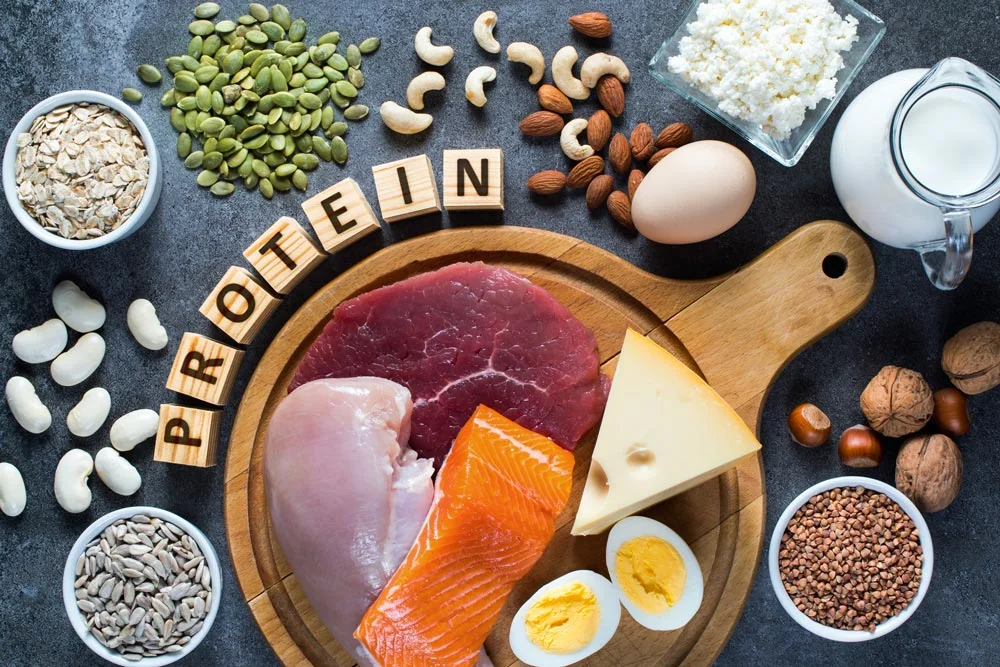
The benefits of eating protein are no secret these days. We know the obvious pro’s of protien, like how the macronutrient can help keep you sated and full longer, help you produce more antibodies to fight off illnesses, give you more energy, and do much more good for your body. Not only is protein a very necessary part of our diets, and it is also a very important part of athletic recovery and progress. (1)
Given all of the benefits of protein, you might be wondering – if protein is so good for my body during my waking hours – could it also be good for my sleep?
As it turns out, that answer is pretty complicated. While most are unanimous that protein helps out human beings during their waking hours, there is no conclusive guidance on how the amount of protein that we eat during the really impacts how we are sleeping at night.
What Is Protein?
Protein is a macronutrient that is made up of amino acids, which are important building blocks for the human body. We need them to produce crucial chemical reactions within our body and help us make new hair, muscle and other tissue within our body. (2)
Since humans can’t store amino acids in our bodies, we either have to make them or modify the amino acids that we consume in through our diets. There are nine amino acids, otherwise known as essential amino acids, that have to come from our diets. These amino acids are: histidine, isoleucine, leucine, lysine, methionine, phenylalanine, threonine, tryptophan, and valine.
If you recognize one of these amino acids, you aren’t alone. Tryptophan is famous for putting you to sleep, particularly after Thanksgiving meals. Tryptophan is often found in turkey (among other foods) and helps your body produce melatonin and serotonin, which can help put you to sleep. (3)
The average adult needs anywhere between 10%-35% of their daily calories to come from protein, and the exact amount of protein you need to consume varies between the size of your body and your activity level. It’s also important to note that all sources of protein are not created equally. Some sources of protein are lower in fat and sodium than others, and generally considered healthier sources of protein. For example, getting your protein from plant-based sources, poultry, or fish is generally considered healthier than getting your protein from red meat. (2)
How Does Protein Impact Sleep?
There’s not much conclusive research to prove that the amount of protein that you’re eating can impact how much you’re sleeping one way or the other. However, there have been several studies that have suggested some different approaches when it comes to thinking about protein and sleep.
For example, a 2022 study analyzing the relationship between protein consumption and sleep from Nutrition Reviews found that, “The qualitative analyses showed that increased protein consumption has little influence on sleep outcomes.” However, the researchers did note that “strength of the evidence is low and more randomized controlled trials that focus on this specific research question are warranted.” (4).
A 2024 study from the European Journal of Clinical Nutrition found that the type of protein that you consume might have a more substantial impact on your sleep. The study found that “intakes of processed red meat and poultry were associated with worse sleep quality, whereas no or positive associations were observed for dairy and fish protein.” (5)
The Bottom Line
While we can’t say for sure whether or not the amount of protein you consume during the day is going to impact your sleep in a meaningful way, it’s still important to consume a balanced diet to ensure that your body is getting the fuel it needs during the day.
Sources
- A Building Block for Good Health: The Benefits of Protein. Atrium Health. Published February 2024. Accessed July 29, 2024. https://atriumhealth.org/dailydose/2024/02/22/a-building-block-for-good-health-the-benefits-of-protein
- Protein. Harvard T.H. Chan School of Public Health. Accessed July 29, 2024. https://nutritionsource.hsph.harvard.edu/what-should-you-eat/protein/#what-is-protein
- Tryptophan. Mount Sinai. Accessed July 29, 2024. https://www.mountsinai.org/health-library/special-topic/tryptophan#:~:text=The%20body%20uses%20tryptophan%20to,energy%20metabolism%20and%20DNA%20production.
- Wirth, Janine, Hillesheim, Elaine, Brennan, Lorraine. Protein intake and its effect on sleep outcomes: a systematic review and meta-analysis of randomized controlled trials. Nutrition Reviews. 2022. DOI: https://doi.org/10.1093/nutrit/nuac061
- Wirth, Janine, Lin, Kehaun, Brennan, Lorraine, et al. Protein intake and its association with sleep quality: results from 3 prospective cohort studies. European Journal of Clinical Nutrition. 2024. DOI: https://doi.org/10.1038/s41430-024-01414-y


























